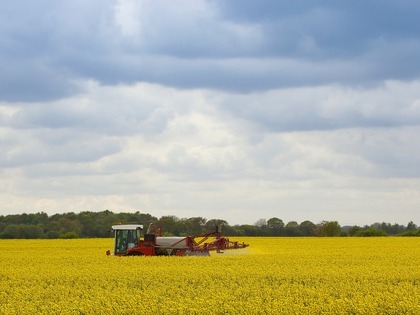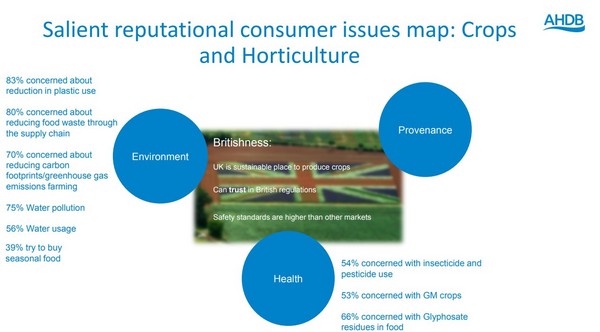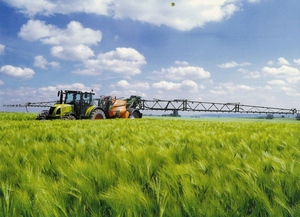
We have recently been to see the stage show Tina...
It is about the life of Tina Turner and what a life it has been - and what a show! We actually saw Ike and Tina Turner in the late 1960s when they performed at the University of Reading. It was a little underwhelming because they just stood in front of the stage curtains and sang to a backing soundtrack. Even then, Ike was known for his stinginess and we were, sadly, not surprised that he would not pay for a live backing band.
Agricultural production and attitudes to the methods we now use have changed radically since then. There is once again much discussion on Integrated Pest Management (IPM). This is partly because CRD (the Chemicals Regulation Division of HSE) is reviewing the UK National Action Plan for pesticides.
This table is reproduced here by kind permission of AHDB
In addition, there is a desire by everyone to reduce pesticide use. Farmers won’t spend money on them if they’re not necessary or can be economically avoided and many in society are uncomfortable about their use. After saying that, according to recent prompted surveys by AHDB, consumers are currently more concerned about plastic use and food waste through the food chain, and the impact of food production on climate change.
These and other surveys remind us that the industry needs to think far wider than just IPM when responding to the concerns of consumers. I have been thinking about this and have come up with a package that might demonstrate the true value of today’s agronomy methods. Calling it conventional agronomy does not convey its value to society. I would rather rebrand the best of conventional agronomy to something like 1World Agronomy.
What can 1World Agronomy deliver?
- A higher level of food security and reliability of supply along with lower food prices when compared to organic methods.
- More biodiversity per tonne of production than organic methods. This is because of the significantly higher production/ha made possible by modern plant breeding methods, pesticides and inorganic fertilisers that provide the opportunity to free more land to be devoted to true biodiversity. I use the term 'true biodiversity' advisedly. There is far more to biodiversity than just butterflies and farmland birds. Farmland birds were only niche species before farming became established over significant areas of the country. Their niche was originally created by large animals creating gaps in the forests that covered our land. Hence, there is a need to devote land to the other species that also used to share this space. This is where the prudent adoption of wilding significant tracts of the countryside comes in. I am not saying that we should forget farmland birds and butterflies but they should be viewed through a wider focus.
- A reduction of in-field food waste due to pesticides controlling insect pest, weed and disease levels. That is what pesticides along with inorganic fertilisers do; enable the far more efficient use of solar energy. UK wheat yields in organic agriculture are around 4.0 t/ha below those of conventional agriculture. That is a loss per hectare of sufficient wheat flour to provide around 4,000 standard loaves of bread. Now that is food waste on a truly epic scale.
- A reduction of energy use and greenhouse gas production per tonne of production when compared to organic methods. There is a wide tranche of scientific papers have come to this conclusion. Carbon reduction pressure groups have recognised this fact for some time.
- A reduction in nitrate leaching per tonne of production when compared to organic crop production. This is a more contestable statement, partly because of the difficulty in doing fair comparisons. A major UK study concluded that nitrate leaching/ha is perhaps a little bit lower with the organic system but when you take yields into account, the nitrate leaching/tonne of production would be significantly lower with the conventional system. In contrast, a French study suggests that nitrate leaching is just a little bit higher with conventional production, even when yield is taken into account. However, in this study yield was measured as nitrogen harvested and included cutting all the lucerne (alfalfa) produced in the two to three-year break in the organic system and measuring its content. I am not sure assuming 100% of utilisation of this crop is a justified approach, particularly when this major component of the organic rotation is fed through animals!
- Perhaps similar soil organic carbon (SOC) levels to organically managed soils. There is really no convincing evidence that carbon sequestration is higher in organic systems. Interestingly, the French research to which I have just referred suggests that there are similar levels of SOC in both conventional and organic farms. Researchers in Denmark consider the claim of beneficial effects of organic farming on SOC is only because organic farmers tend to import more organic manures from nearby farms. It is not due to the other practices inherent in organic agriculture and, of course, the option to use more organic manures is also available to conventional farmers. Higher levels of SOC have been recorded in organic arable systems in the USA where an often disproportionate level of organic manures (i.e. well above rotational requirements for a major nutrient) have been imported from nearby farms. Again, fair comparisons are difficult to achieve which is perhaps why there has been no published data from the UK. There is one paper that shows that UK allotment soils have higher SOC than conventionally farmed soils due to the level of organic manures used, many imported from elsewhere.
 Plastic reduction
Plastic reduction
Plastic reduction in the food chain is now a major objective for consumers. Much of this plastic use is beyond the control of farmers. However, there is plastic used on farms, sometimes for protecting crops. There is never a worse sight than plastic trapped in hedges and fences or left in an uncontrolled manner on-farm. All the plastic used should be collected and disposed of in an acceptable manner and not left in full view of the public.
Pesticides in food and water
The perceived downsides for conventional farming are pesticide residues in food and pesticides in water. The Government monitors pesticides in food and the results are freely available on the web. It is a very transparent process. There is a significantly lower proportion of instances of residues in UK produced food than in imported food and the levels that do occur are not deemed to be a risk to health. In fact, a recent Danish study concluded that pesticide residues in food are as risky to human health as drinking one glass of wine every seven years!
Surprisingly, at least to me, the standards for pesticide residues are the same for organic food as for conventionally produced food. There are detections of synthetic pesticides, which should not have been used on organic crops, in imported organic food, albeit in a much lower proportion of tests than in conventionally produced imported food.
The industry has made real progress in reducing levels of pesticides in water through adopting measures introduced by the Voluntary Initiative (VI). This has aided water companies by reducing the direct and indirect costs of removing pesticides from domestic supplies in order to meet the stringent standards of the Drinking Water Directive. There is more to do in order to reduce further pesticide movement to water, such as using information technology to improve guidance on the location and width of buffer strips in individual fields.
New technologies will also help in further reducing pesticide use. For instance, it is now becoming feasible to measure, almost instantly, insecticide resistance in the field. This may provide, for example, an answer to the current conundrum of whether it is worth spraying a pyrethroid to control cabbage stem flea beetle in oilseed rape. There are other technologies being developed which may lead to further reductions in inputs.
Simply the best
 The good news is that a high proportion of conventional farmers in the UK already meet the standards to qualify for 1World Agronomy status. Great care is taken with pesticide and fertiliser use and there is the continuing fixation with soil care, which now includes the widespread adoption of cover crops.
The good news is that a high proportion of conventional farmers in the UK already meet the standards to qualify for 1World Agronomy status. Great care is taken with pesticide and fertiliser use and there is the continuing fixation with soil care, which now includes the widespread adoption of cover crops.
So why not rebrand conventional arable production in order to enlighten consumers on how it meets their aspirations? The name 1World demonstrates our commitment to minimising greenhouse gas generation in food production and we are playing our part in international food security as well as meeting wider consumer concerns. UK arable production has a great narrative to tell, so why not present it in a way that the consumer will understand? As Tina Turner would sing, it is Simply the Best.
